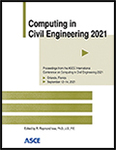Artificial-Neural-Network-Based Model for Predicting Heating and Cooling Loads on Residential Buildings
Publication: Computing in Civil Engineering 2021
ABSTRACT
A population growth of around 1,000 people per day is the main factor contributing to the increase in housing demands in Florida. Optimization of the energy performance of residential buildings is crucial for the reduction of greenhouse gas emissions and fossil fuel consumption. This optimization entails the designers to accurately predict the energy consumption of buildings right from the design stage. Traditional energy modeling techniques require a lot of expertise and tend to be time-consuming and lacking in terms of energy predictions. Artificial intelligence (AI) techniques have been recently used to predict the energy usage of buildings and to be an alternative solution to such engineering methods. This study developed an artificial neural network (ANN) model based on a large data set of more than 18,000 newly constructed single-family houses in Florida between the years 2009 and 2019 to predict the heating and cooling loads on single-family houses. An ANN model based on this data set is developed to predict the energy usage of detached residences. The ANN will help designers to make the right decisions during the conceptual design stage of residential projects, and to explore the different design options using generative design for energy optimization purposes.
Get full access to this chapter
View all available purchase options and get full access to this chapter.
REFERENCES
Ascione, F., Bianco, N., De Stasio, C., Mauro, G., and Vanoli, G. (2017). “Artificial neural networks to predict energy performance and retrofit scenarios for any member of a building category: A novel approach”. Energy, 118, 999–1017.
Alwisy, A., BuHamdan, S., and Gül, M. (2018). Criteria-based ranking of green building design factors according to leading rating systems. Energy and Buildings, 178, pp. 347–359.
Cebrat, K., and Nowak, Ł. (2018). Revealing the relationships between the energy parameters of single-family buildings with the use of Self-Organizing Maps. Energy and Buildings, 178, pp. 61–70.
Elias, R., and Issa, R. R. A. (2019). “Big Data: A Decade of Energy Characteristics of Single-Family Homes in Florida”. In Proceedings of the 1st ACM International Workshop on Urban Building Energy Sensing, Controls, Big Data Analysis, and Visualization (UrbSys'19). Association for Computing Machinery, New York, NY, USA, 101–111. DOI: https://doi.org/10.1145/3363459.3363533.
García Kerdan, I., and Morillón Gálvez, D. (2020). “Artificial neural network structure optimisation for accurately prediction of exergy, comfort and life cycle cost performance of a low energy building”. Applied Energy, 280, 2–19.
Khayatian, F., Sarto, L., and Dall’O’, G. (2016). “Application of neural networks for evaluating energy performance certificates of residential buildings”. Energy and Buildings, 125, 45–54.
Lee, S., Jung, S., and Lee, J. (2019). “Prediction Model Based on an Artificial Neural Network for User-Based Building Energy Consumption in South Korea”. Energies, 12(4), 608.
Moradzadeh, A., Mansour-Saatloo, A., Mohammadi-Ivatloo, B., and Anvari-Moghaddam, A. (2020). “Performance Evaluation of Two Machine Learning Techniques in Heating and Cooling Loads Forecasting of Residential Buildings”. Applied Sciences, 10(11), 3829.
Seyedzadeh, S., Rahimian, F., Glesk, I., and Roper, M. (2018). Machine learning for estimation of building energy consumption and performance: a review. Visualization in Engineering, 6(1).
Sholahudin, S., Alam, A. G., Baek, C. I., and Han, H. (2016). “Prediction and Analysis of Building Energy Efficiency Using Artificial Neural Network and Design of Experiments”. Applied Mechanics and Materials, 819, 541–545.
Singh, A., Gupta, I., Verma, R., Gautam, V., and Yadav, C. (2020). “A Survey on Data Leakage Detection and Prevention”. SSRN Electronic Journal.
Sun, Y., Haghighat, F., and Fung, B. (2020). “A review of the-state-of-the-art in data-driven approaches for building energy prediction”. Energy and Buildings, 221, 110022.
Turhan, C., Kazanasmaz, T., Uygun, I., Ekmen, K., and Akkurt, G. (2014). “Comparative study of a building energy performance software (KEP-IYTE-ESS) and ANN-based building heat load estimation”. Energy and Buildings, 85, 115–125.
US Energy Information Administration. (2019). International Energy Outlook 2019. US Energy Information Administration, Washington, DC, 52.
Wang, Z., and Srinivasan, R. (2015). “A Review of Artificial Intelligence Based Building Energy Prediction with a Focus on Ensemble Prediction Models”. Winter Simulation Conference, IEEE 2015, Piscataway, NJ, 3438–3445.
Information & Authors
Information
Published In
History
Published online: May 24, 2022
Authors
Metrics & Citations
Metrics
Citations
Download citation
If you have the appropriate software installed, you can download article citation data to the citation manager of your choice. Simply select your manager software from the list below and click Download.
